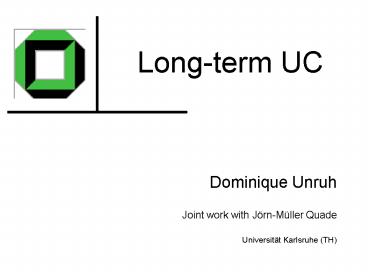Longterm UC - PowerPoint PPT Presentation
1 / 22
Title:
Longterm UC
Description:
We believe in complexity assumptions for today's adversaries. But adversaries may store data ... Looks like RO, but can be broken in retrospect. Signature Card ... – PowerPoint PPT presentation
Number of Views:55
Avg rating:3.0/5.0
Title: Longterm UC
1
Long-term UC
- Dominique Unruh
- Joint work with Jörn-Müller Quade
- Universität Karlsruhe (TH)
2
Overview
- Motivation
- Definition Discussion
- (Im)possibility results with CRS coin toss
- Other setup-assumptions Signature cards, etc.
- Quantum long-term UC
3
The long-term threat
- VENONA project
- NSA and GCHQ stored Russian ciphersfor years
- Unbreakable ciphers became breakable
- BSI key length recommendations
- Only for 6 years
- Quantum computers might break most asymmetric
systems
4
Long-term security
- We believe in complexity assumptions for todays
adversaries - But adversaries may store data
- Long-term security
- Adversary is computationally limited during
protocol run - But unlimited afterwards
- Secrets must stay secrets forever
5
Examples
- Statistical zero-knowledge arguments NOVY98
- Unconditionally hiding commitments NOVY98
- Bounded storage modelkey exchange, OT
DM02,CCM02 - Quantum key exchange with computational
authentication - But do these protocols compose?
6
Universal Composability
- Composition of protocols can be problematic
- Especially zero-knowledge is known to produce
surprising effects - Plug-and-play all-round solutionUniversal
Composability (UC) - I want it all! Long-term UC
7
Long-term UC
computational
statisticallyindistinguishableviews
8
Strict but necessary
- Long-term UC very strict
- Is it necessary?
- Long-term stand-alone security Composability?
Long-term UC Lin03 - Open Is there a weaker definition of long-term
stand-alone security?
9
Seems easy but isnt
- What about
- Unconditionally hiding UC commitments DN02
- Statistical UC zero knowledge arguments
- Both using only a CRS
- Below No CRS-based scheme for commitment or ZK
is long-term UC - So these are not long-term UC
10
Impossibility of commitments
indep. of b
OK
b
b independent of b ? Contradiction.
11
Only temporarily secret
- We only used one property of
- The senders communication with the functionality
can be (efficiently or inefficiently) calculated
from the other parties view. - We call this Only temporarily secret for S
- Corollary If is temporarily secret for
S, we cannot use it for commitment
12
Impossibility of ZK
- Can we use the same proof idea for ZK?
- Witness w independent of w
- Infeasible for SAT if NP?P/poly
13
CRS is useless
- Coin toss, CRS and others
- Cannot be used for long-term UC commitment and
SAT-ZK - Other proof CRS cannot be used for nontrivial ZK
- But can nontrivial ZK be realised using coin
toss? Surely not!
14
No ZK from coin toss
- If simulator takes role of prover
- Witness (information-theoretically) not contained
in interaction. - If simulator takes role of verifier
- Witness (information-theoretically) contained in
interaction. - Both interactions statistically
indistinguishable - Witness contained and not contained at the same
time ? ZK impossible from coin toss. - Wrong!
15
Blum-Integer ZK
- Prover knows factorisation of npq.
n
npq
V
r
r
- Simulator can choose r together with a root
- This allows simulation and extraction
- Protocol is long-term UC zero-knowledge
16
Other setup-assumptions
- Random-Oracle
- Trusted Pseudorandom Function
- Looks like RO, but can be broken in retrospect
- Signature Card
- Even the legitimate user does not know the
secret key - Available today! And growing
- They all allow long-term UC commitment ZK
17
Using signature cards
- P wants to prove x.
- P proves to V (with statistical ZK)
- I know my secret key or
- I know a signed witness
- Simulator can perform this proof,because he
knows all secret keys - Simulator can extract,because he learns signed
witness - Long-term UC zero-knowledge argument
18
Long-term quantum OT
- Impossible from scratch
- Possible given signature cards
- Signature cards ? Commitments (classical)
- Can be lifted to quantum
- Commitments ? OT (quantum) Yao95,HMQ95
- Composition theorem Long-term quantum OT from
signature cards
19
Again Statistically hiding UC commitments
- We know Statistically hiding UC commitments are
not necessarilylong-term UC - But where do they fail?
- CRS ? Statistically hiding UC commitments
- Statistically hiding UC commitments ? OT
- But long-term quantum OT from CRS is impossible
20
Conclusions
- Long-term UC is desirable
- But very strict
- CRS useless
- Coin-toss almost useless
- Signature cards useful
- SC quantum channel especially useful
21
Outlook
- Beyond ZKCOM
- Equals passive unconditional security?
- Other assumptions (whats out there?)
- Efficient protocols (ours are not)
- Long-term UC key-exchange
- Probably impossible with most primitives
- Easy with quantum
22
The End
Thank you for your attention































